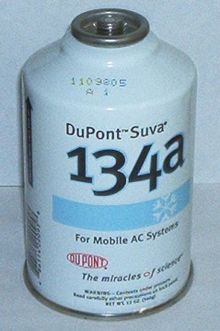
Back وسيط تبريد Arabic Хладилен агент Bulgarian শীতলক Bengali/Bangla Fluid refrigerant Catalan Chladivo Czech Kølemiddel Danish Kältemittel German Ψυκτικό Greek Refrigerante (refrigeración) Spanish Külmutusagens ET

A refrigerant is a working fluid used in cooling, heating or reverse cooling and heating of air conditioning systems and heat pumps where they undergo a repeated phase transition from a liquid to a gas and back again. Refrigerants are heavily regulated because of their toxicity and flammability[1] and the contribution of CFC and HCFC refrigerants to ozone depletion[2] and that of HFC refrigerants to climate change.[3]
Refrigerants are used in a direct expansion (DX- Direct Expansion) system (circulating system)to transfer energy from one environment to another, typically from inside a building to outside (or vice versa) commonly known as an air conditioner cooling only or cooling & heating reverse DX system or heat pump a heating only DX cycle. Refrigerants can carry 10 times more energy per kg than water, and 50 times more than air.
Refrigerants are controlled substances and classified by International safety regulations ISO 817/5149, AHRAE 34/15 & BS EN 378 due to high pressures (700–1,000 kPa (100–150 psi)), extreme temperatures (−50 °C [−58 °F] to over 100 °C [212 °F]), flammability (A1 class non-flammable, A2/A2L class flammable and A3 class extremely flammable/explosive) and toxicity (B1-low, B2-medium & B3-high). The regulations relate to situations when these refrigerants are released into the atmosphere in the event of an accidental leak not while circulated.
Refrigerants (controlled substances) must only be handled by qualified/certified engineers for the relevant classes (in the UK, C&G 2079 for A1-class and C&G 6187-2 for A2/A2L & A3-class refrigerants).
Refrigerants (A1 class only) Due to their non-flammability, A1 class non-flammability, non-explosivity, and non-toxicity, non-explosivity they have been used in open systems (consumed when used) like fire extinguishers, inhalers, computer rooms fire extinguishing and insulation, etc.) since 1928.
- ^ United Nations Environment Programme (UNEP). "Update on New Refrigerants Designations and Safety Classifications" (PDF). ASHRAE. Retrieved 6 October 2024.
- ^ "Phaseout of Class II Ozone-Depleting Substances". US Environmental Protection Agency. 22 July 2015. Retrieved October 6, 2024.
- ^ "Protecting Our Climate by Reducing Use of HFCs". United States Environmental Protection Agency. 8 February 2021. Retrieved 6 October 2024.